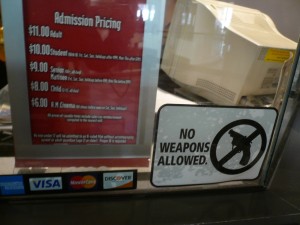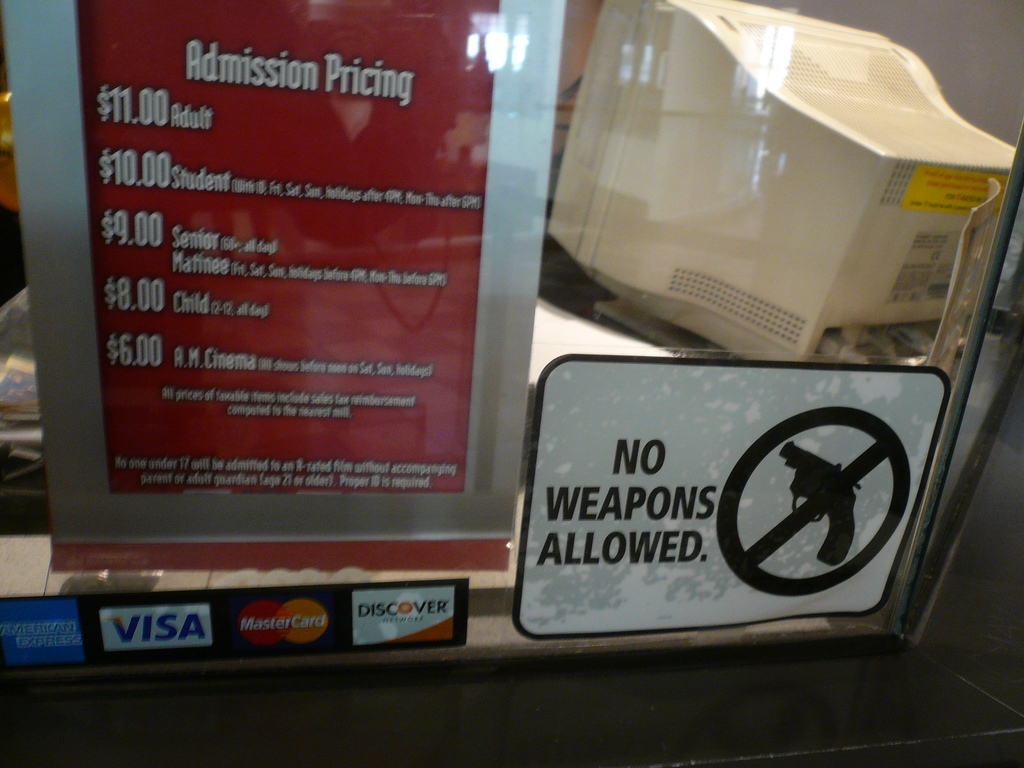Frequently, after publishing content online, I find myself learning something. Often this is from looking at what type of traffic our websites get.
This week is certainly no exception. After publishing some thoughts about the Aurora, Colorado theater shooting and contrasting it with a recent Florida shooting incident, I’ve learned that a lot of people have a similar question:
Is it legal to carry a firearm into a theater in the State of Florida?
This is of particular interest to me since AMC Theatres has a nationwide policy banning firearms from their locations. The ban therefore applies to the location we sometimes patronize in a nearby mall, and to at least one other Florida location in Clearwater (see a copy of the AMC “No Weapons Allowed” sign here).
First: Florida Law
Florida law does not specifically prohibit the legal (concealed) carry of firearms in theaters. Of course, legal concealed carry in Florida requires a Concealed Weapons Permit. (If you are already a permit holder, then you are well aware that a number of conditions apply to make your concealed carry of a firearm legal.)
Without a permit, in Florida you are not permitted to carry a concealed firearm on your person anywhere other than in your home or place of business.
There are many ins and outs to Florida law related to firearms and other weapons. I am not an attorney or expert in the law, nor would I pretend to be one. If you own (or plan to own) firearms in Florida, then I strongly recommend that you get a copy of the book widely considered to be the “Bible” of Florida firearms law by attorney Jon Gutmacher. Don’t just get a copy… devour it and keep it close by for reference.
Second: “No Guns Allowed” Signs

Some businesses choose to place signage prohibiting firearms in their establishments. AMC Theatres is an example. Regal Cinemas may be another example if various internet chatter is to be believed.
Again, I am not an attorney or expert, but from my research a business that has invited you (by opening its doors to the public) onto its premises cannot prevent you from bringing a legal concealed weapon onto its premises.
That said, if they discover your firearm (which one has to really wonder how they would do if in fact it is properly concealed), they can ask you to leave. If any business asks you to leave and you refuse, you are likely to be guilty of trespass (regardless of whether you have a firearm).
If you are found guilty of trespass and you are carrying a firearm, then you are quite likely to be guilty of armed trespass, which is a third degree felony.
This is probably not something you want to risk. It is also quite possibly open to interpretation, which could go badly for you if you find yourself in this situation. Find more on this topic here.
The good news is that you are unlikely to be guilty of trespass (at least in a business which is open to the public—assuming you are there during its hours of operation) unless you refuse to leave after first being warned to leave.



